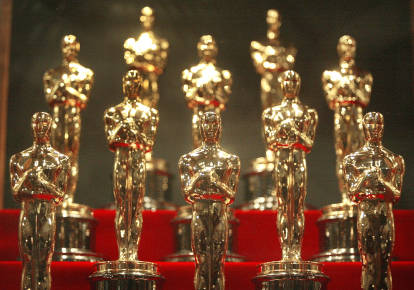In his acceptance speech at the 1981 Oscars (best original screenplay, Chariots of Fire), Colin Welland offered the now famous prediction that ‘The British are coming!’ There have since been some notable British Oscar successes: Jessica Tandy for Driving Miss Daisy (1989); director Anthony Minghella for The English Patient (1996); Helen Mirren (in The Queen, 2006); and — maintaining the royal theme — awards for best director, actor, and film for The King’s Speech in 2011.

But looking at all British Oscar winners — since the first Academy Awards in 1929 — presents a different story. Less the ‘British are coming!’, more the ‘British have been!’ A full list of Oscar winners with entries in the Oxford Dictionary of National Biography (currently 79 individuals) lists 70 recipients between 1929 (Charlie Chaplin, The Circus) and 1980 (Alec Guinness, honorary award), and just 9 winners since Colin Welland’s rousing prediction. The Oxford DNB’s selection criteria — that all people included are deceased in or before 2009 — means this imbalance isn’t really a revelation, nor should it come as a surprise. Quite simply, and happily, most post-1981 British winners remain in good, creative health.
But the ODNB’s Oscar list is nonetheless an interesting reminder of outstanding talent, and outstanding films, from the history of British cinema. Here, of course, you’ll find the great names: Vivien Leigh (twice best actress for Gone with the Wind, 1940, and A Street Car Named Desire, 1952), Laurence Olivier (special award for Henry V, 1947 and best actor, Hamlet, 1949), or the lovely Audrey Hepburn (best actress, Roman Holiday, 1954). Also notable is that some of the most successful figures in British cinema have worked behind the camera, including the directors Carol Reed and David Lean who were both double winners.
The Oxford DNB’s list also reminds us of the perhaps forgotten successes: Jack Clayton whose The Bespoke Overcoat won ‘best short (two-reel) film’ in 1957 or Elizabeth Haffenden, winner, in 1960, of the best costume (colour) Oscar for the often scantily-clad Ben-Hur. Then there are the surprises: did you know that George Bernard Shaw won a statuette in 1939 for his adapted screenplay of Pygmalion, or that the dramatist John Osborne collected the same award for Tom Jones in 1964?
Finally, there are the ones who almost got away. It seems extraordinary that Stanley Kubrick (he lived in Britain, so he’s in the ODNB) won only once — and this for ‘best special effects’ in 2001: A Space Odyssey. Or that Cary Grant (born in Bristol) had to make do with an ‘honorary award’ in 1970. Perhaps most surprising is that the giant of twentieth-century film, both in the UK and US, only reached the stage once, to receive the Irving G. Thalberg memorial award in 1968. He, of course, is Alfred Hitchcock whose life is recreated in an eponymous film out this month — and possibly on next year’s Oscar shortlist.
In addition to the Oxford DNB biographies above, the life stories of Audrey Hepburn and Cary Grant are also available as episodes in the ODNB’s free biography podcast.
Now, from podcast to a pop quiz from Who’s Who, we’ll test you not only on what you know about the BAFTAs and Oscars, but who you know.
Your Score:
Your Ranking:
The Oxford Dictionary of National Biography is the national record of men and women who have shaped British history and culture, worldwide, from the Romans to the 21st century. In addition to 58,500 life stories, the ODNB offers a free, twice monthly biography podcastwith over 175 life stories now available. You can also sign up for Life of the Day, a topical biography delivered to your inbox, or follow @odnb on Twitter for people in the news. The Oxford DNB is freely available via public libraries across the UK. Libraries offer ‘remote access’ allowing members to log-on to the complete dictionary, for free, from home (or any other computer) twenty-four hours a day.
Who’s Who is the essential directory of the noteworthy and influential in every area of public life, published worldwide, and written by the entrants themselves. Who’s Who 2013 includes autobiographical information on over 33,000 influential people from all walks of life. The 165th edition includes a foreword by Arianna Huffington on ways technology is rapidly transforming the media.
Subscribe to the OUPblog via email or RSS.
Subscribe to only television and film articles on the OUPblog via email or RSS.
Image credit: CHICAGO – JANUARY 23: Oscar statuettes are displayed during an unveiling of the 50 Oscar statuettes to be awarded at the 76th Academy Awards ceremony January 23, 2004 at the Museum of Science and Industry in Chicago, Illinois. The statuettes are made in Chicago by R.S. Owens and Company. (Photo by Tim Boyle) EdStock via iStockphoto.
The post ‘And the Oscar went to …’ appeared first on OUPblog.


